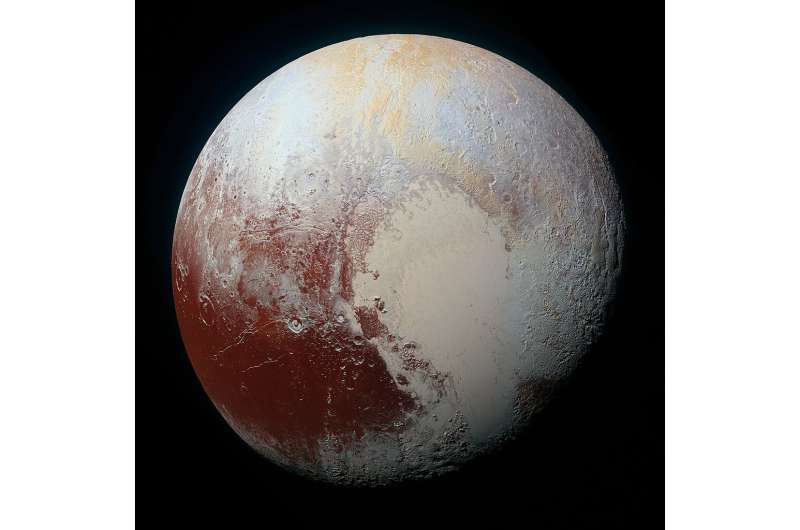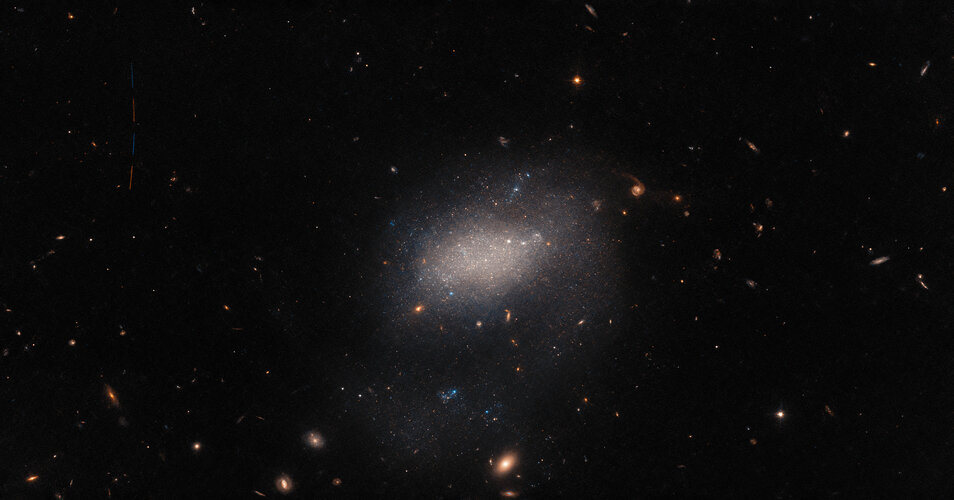
Copernical Team
Sols 3718-3720: Go For Drilling at Encanto
 In the previous plan, Curiosity conducted a preliminary assessment of the potential drill target "Encanto" (as seen in the above MAHLI image) and today we received the data. The drill preload test and contact science data look good, so we are GO for our third attempt to get a sample of this marker band.
Today's 3-sol plan includes the full drill on the first sol, followed by portion charac
In the previous plan, Curiosity conducted a preliminary assessment of the potential drill target "Encanto" (as seen in the above MAHLI image) and today we received the data. The drill preload test and contact science data look good, so we are GO for our third attempt to get a sample of this marker band.
Today's 3-sol plan includes the full drill on the first sol, followed by portion charac Astronauts conduct first ISS spacewalk of 2023
 Two astronauts embarked on the first spacewalk of 2023 on Friday as they worked toward upgrading the International Space Station's power generation system.
NASA astronaut Nicole Mann teamed up with Koichi Wakata of the Japan Aerospace Exploration Agency for the morning spacewalk, which NASA officials said lasted seven hours and 21 minutes. They installed a modification kit at the far en
Two astronauts embarked on the first spacewalk of 2023 on Friday as they worked toward upgrading the International Space Station's power generation system.
NASA astronaut Nicole Mann teamed up with Koichi Wakata of the Japan Aerospace Exploration Agency for the morning spacewalk, which NASA officials said lasted seven hours and 21 minutes. They installed a modification kit at the far en Chinese astronauts send Spring Festival greetings from space station
 The Shenzhou-15 astronauts Fei Junlong, Deng Qingming and Zhang Lu sent their Spring Festival greetings from China's Tiangong space station in a video released by the China Manned Space Agency (CMSA) on New Year's Eve.
The trio, dressed in blue jumpsuits with dark red patterns, each held a sticker showing their own calligraphy. Two of the stickers were written with the Chinese character "f
The Shenzhou-15 astronauts Fei Junlong, Deng Qingming and Zhang Lu sent their Spring Festival greetings from China's Tiangong space station in a video released by the China Manned Space Agency (CMSA) on New Year's Eve.
The trio, dressed in blue jumpsuits with dark red patterns, each held a sticker showing their own calligraphy. Two of the stickers were written with the Chinese character "f Galileo tribute unveiled as Juice says 'Farewell, Europe'
 A commemorative plaque celebrating Galileo's discovery of Jupiter's moons has been unveiled on ESA's Jupiter Icy Moons Explorer, Juice. The spacecraft has just completed its final tests before departing Toulouse, France, for Europe's Spaceport to count down to an April launch.
As part of the final preparations a commemorative plaque was mounted on the spacecraft as a tribute to Italian ast
A commemorative plaque celebrating Galileo's discovery of Jupiter's moons has been unveiled on ESA's Jupiter Icy Moons Explorer, Juice. The spacecraft has just completed its final tests before departing Toulouse, France, for Europe's Spaceport to count down to an April launch.
As part of the final preparations a commemorative plaque was mounted on the spacecraft as a tribute to Italian ast NASA's Lucy Mission Suspending Further Solar Array Deployment Activities
 NASA's Lucy mission team has decided to suspend further solar array deployment activities. The team determined that operating the mission with the solar array in the current unlatched state carries an acceptable level of risk and further deployment activities are unlikely to be beneficial at this time. The spacecraft continues to make progress along its planned trajectory.
Shortly after th
NASA's Lucy mission team has decided to suspend further solar array deployment activities. The team determined that operating the mission with the solar array in the current unlatched state carries an acceptable level of risk and further deployment activities are unlikely to be beneficial at this time. The spacecraft continues to make progress along its planned trajectory.
Shortly after th NASA, Boeing teams achieve milestone ahead of crewed flight
 NASA and Boeing recently completed a full start to finish integrated mission dress rehearsal for the company's CST-100 Starliner flight with astronauts to the International Space Station, which is scheduled to launch in April 2023.
The Crew Flight Test, or CFT, will launch NASA astronauts Barry "Butch" Wilmore and Suni Williams on Starliner - atop a United Launch Alliance Atlas V rocket -
NASA and Boeing recently completed a full start to finish integrated mission dress rehearsal for the company's CST-100 Starliner flight with astronauts to the International Space Station, which is scheduled to launch in April 2023.
The Crew Flight Test, or CFT, will launch NASA astronauts Barry "Butch" Wilmore and Suni Williams on Starliner - atop a United Launch Alliance Atlas V rocket - Buzz Aldrin, second man on the Moon, marries on 93rd birthday

Legendary Apollo 11 astronaut Buzz Aldrin, the second person to set foot on the Moon, said he had married his longtime girlfriend on Friday, his 93rd birthday.
Aldrin and Anca Faur, executive vice president of Buzz Aldrin Ventures, were wed in a private ceremony.
"On my 93rd birthday... I am pleased to announce that my longtime love Dr. Anca Faur & I have tied the knot," Aldrin tweeted along with pictures of himself and Faur, who is reportedly 63.
"We were joined in holy matrimony in a small private ceremony in Los Angeles & are as excited as eloping teenagers."
According to her LinkedIn profile, Faur earned a doctorate in chemical engineering from the University of Pittsburgh in 1996 and had previously worked for Union Carbide and Johnson Matthey before joining Buzz Aldrin Ventures. She had also served as treasurer for the California Hydrogen Business Council.
Aldrin's three previous marriages ended in divorce.
The US astronaut is the last surviving member of the Apollo 11 mission, during which he and Neil Armstrong become the first people to set foot on the Moon, on July 20, 1969.
Exploring the outer solar system takes power: Here's a way to miniaturize nuclear batteries for deep space

As science and technology advance, we're asking our space missions to deliver more and more results. NASA's MSL Curiosity and Perseverance rovers illustrate this fact. Perseverance is an exceptionally exquisite assemblage of technologies. These cutting-edge rovers need a lot of power to fulfill their tasks, and that means bulky and expensive power sources.
Visitor to a galaxy
 Image:
Visitor to a galaxy
Image:
Visitor to a galaxy Watch ESA Director General annual press briefing 2023

Join our start-of-the-year press briefing looking ahead at 2023, with ESA Director General Josef Aschbacher and ESA Directors. They’ll present the next steps of Agenda 2025, looking at new missions, science, space safety and commercialisation of space.
Tune in to #ESAwebTV on 23 January, from 08:00 GMT/09:00 CET, to watch live.
More on ESA’s Vision and Agenda25.

































